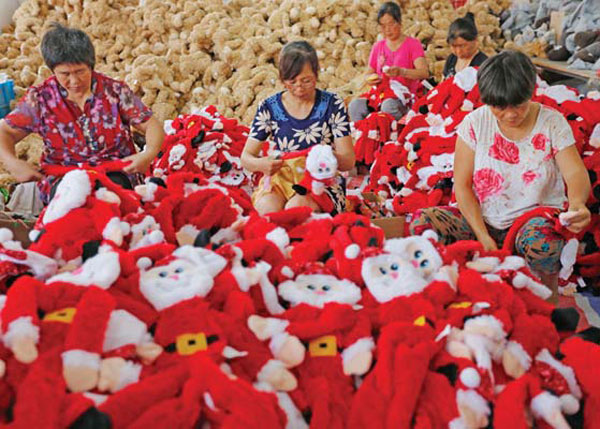Surrogate country approach signals growing protectionism

Employees arrange Christmas toys that will be exported to Western markets in Lianyungang, Jiangsu Province.
On Dec. 12, China officially launched dispute settlement mechanisms at the WTO by requesting consultations with the United States and the European Union regarding the use of the surrogate country approach in anti-dumping investigations against Chinese exports.
In accordance with Article 15 of the accession protocol signed when China joined the WTO in 2001, the surrogate country approach expired on Dec. 11, 2016.
Feng Zongxian, director of the Center for Development and Investment at Xi’an Jiaotong University, said “market economy status” and the surrogate country approach are two different things that cannot be mixed up. There is no international law in the WTO establishing the definition and standards for what constitutes a “market economy status,” which is indeed the product of domestic laws in some Western countries and historically has targeted specific countries, Feng said. By denying China’s “market economy” status, some Western countries hide behind domestic laws and evade international obligations, he added.
“The protocol is legally binding, so whether or not China meets the standard of a market economy as defined by domestic laws in some Western countries, it does not excuse any failure to act in accordance with Article 15,” said Tu Xinquan, dean of the China Institute for WTO Studies at the University of International Business and Economics.
In recent years, some Western countries are losing their comparative edge over China economically, which affects their political decisions and is driving them to adopt more protectionist measures, said Bian Yongzu, a research fellow from the Chongyang Institute for Financial Studies at Renmin University of China.
According to the recent report Reflection and Prospects of China’s 15 Years in the WTO, published by the National Academy of Development and Strategy at Renmin University of China, China has fulfilled its commitment to lower tariffs by 2010 while it has granted foreign companies access to a range of sectors, including finance, telecommunication, construction and distribution.
“Among the 160 service subsectors classified by the WTO, China has opened up more than 100 subsectors, matching the level of developed countries,” according to the report.
Now, it’s time for the WTO members to fulfill their commitment, Tu said. When launching an anti-dumping investigation against Chinese products, the WTO members must follow the prevailing rules of the bloc, determining the dumping margin on the basis of the price and cost of Chinese enterprises, he said. “This is the lawful rights of China as a member of the WTO,” Tu noted.
Su Qingyi, an associate research fellow from the Institute of World Economics and Politics under the Chinese Academy of Social Sciences, said that upholding the obligations of Article 15 will demonstrate whether countries are “rule-breakers or rule-followers.”
China’s economic volume today is far greater than what it was 15 years ago, so denial of China’s “market economy status” will not change China’s importance in world trade, said Zheng Yu, a professor of international politics at Fudan University.
As for some Western countries’ insistence on using the surrogate country approach during anti-dumping investigations, the Chinese government will take necessary measures to protect its legal rights within the WTO regulations, Zheng said.
MAO LI is a reporter at the Chinese Social Sciences Today.

 PRINT
PRINT CLOSE
CLOSE